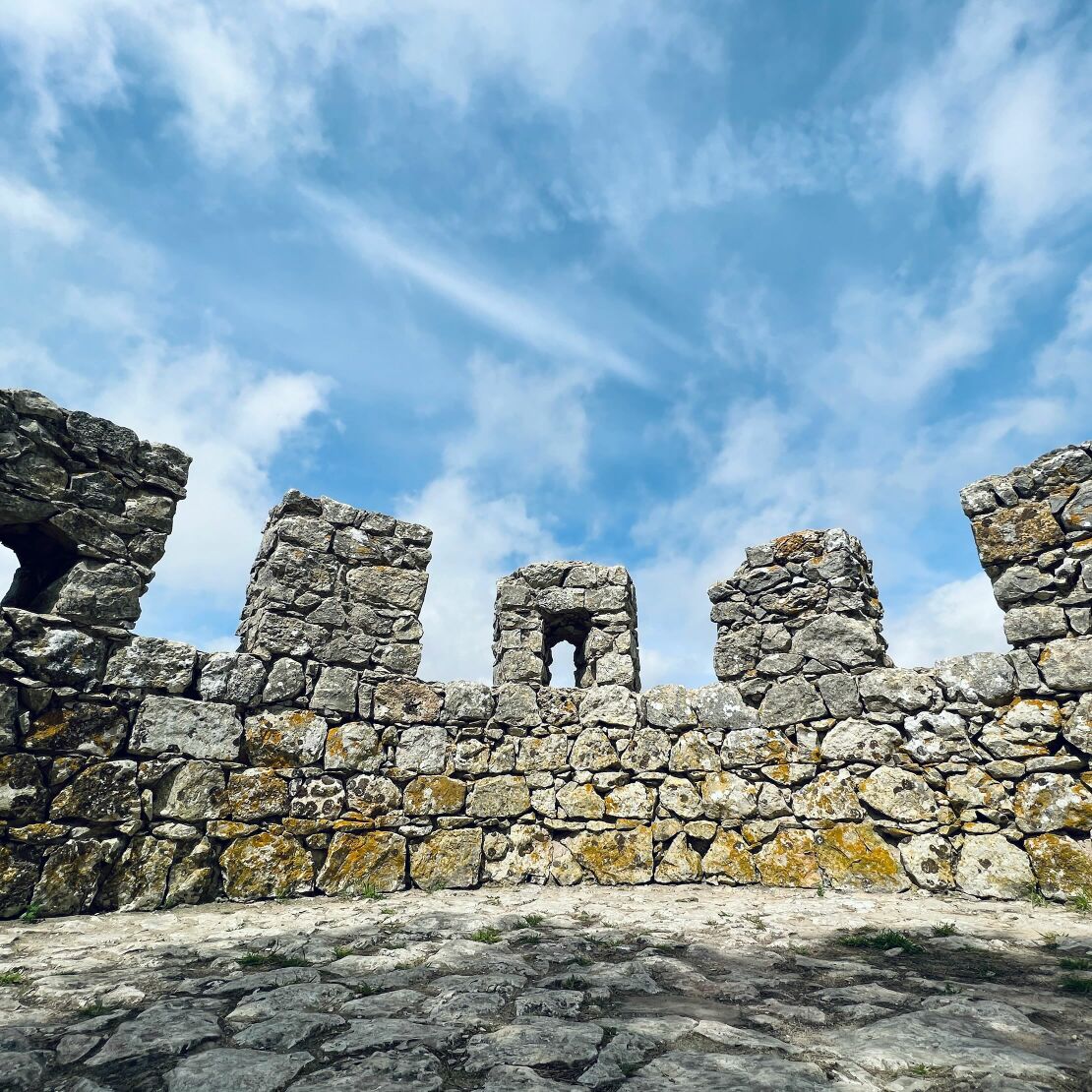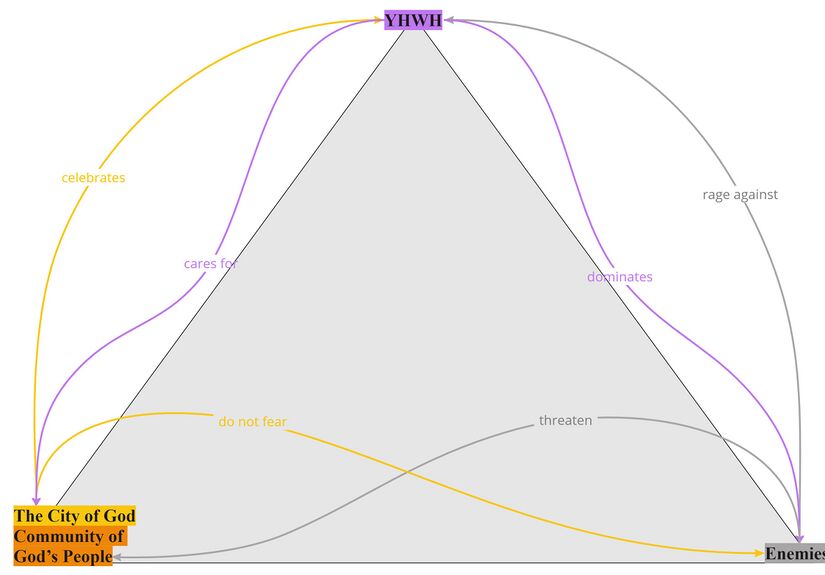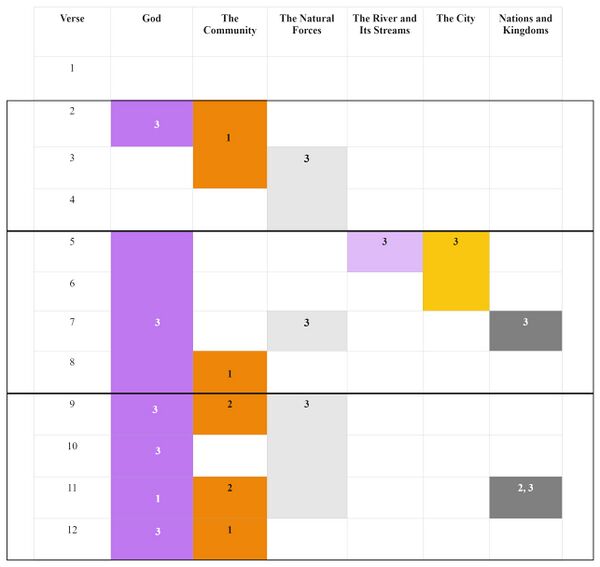Psalm 46 Participant Analysis
From Psalms: Layer by Layer
Psalm 46/Participant Analysis
Choose a PsalmNavigate Psalm 46
Guardian: Ekaterina Kozlova
Participant Analysis
Participant Analysis focuses on the characters in the psalm and asks, “Who are the main participants (or characters) in this psalm, and what are they saying or doing? It is often helpful for understanding literary structure, speaker identification, etc.
For a detailed explanation of our method, see the Participant Analysis Creator Guidelines.
There are 4 participants/characters in Psalm 46:
Profile List
| A Community of God's People |
| "we/us" (vv. 2, 3, 8, 12) |
| The City of God |
| "the holy dwelling [of the Most High]" (v. 5) |
| YHWH |
| "God" (vv. 2, 5, 6, 11) |
| "refuge" (v. 2) |
| "stronghold" (v. 2) |
| "YHWH of Hosts" (vv. 8, 12) |
| "the God of Jacob" (vv. 8, 12) |
| "the Most High" (v. 5) |
| Enemies |
| "nations" (vv. 7, 11) |
| "kingdoms" (v. 7) |
| Natural Forces |
| "the earth" (vv. 3, 7) |
| "the deepest sea" (v. 3) |
| "the deepest sea's waters" (v. 4) |
| "the mountains" (vv. 3, 4) |
| All humanity |
Profile Notes
- A Community of God's People: is the main speaker in the psalm. The text also identifies them through self-referential appellations, i.e., “we” and "us". As per the superscription, this community was supposed to perform the psalm about God's military triumphs in the manner of a choir of young women. As such, the group was to embody their city personified as a woman (see further Participant Tracking notes). Accordingly, the community has a set of related participants (“the city of God”, “the holy dwelling of the Most High”, and “it”) who are featured as recipients of God’s care and protection amidst an international conflict.
- The City of God: The psalm offers no specific details about the identity of the city and its geographical location. The mention of mountains, sea, a river with streams providing water for a city indicates a northern site, e.g., Dan. However, "the preservation and ongoing use of the psalm so that it came to be in the Psalter imply that it came to be a Jerusalem psalm (a “Zion song”; see on Ps. 48) even though Jerusalem is unmentioned"[1]; see further The River and Its Streams in Psalm 46).
- YHWH: one of the main participants in the psalm is God, who appears under various names and appellations, i.e., Elohim, the Most High, YHWH, YHWH of Hosts, and the God of Jacob. Other descriptors featured in the song for God are “refuge”, “fortress,” and "stronghold". These architectural designations for God make his identification with the city and its community particularly intimate. In a song about attempted urbicide, the metaphorization of God as urban artifacts and landmarks links the city's fate with God's own and guarantees its inviolability.
- Nations and Kingdoms: The identity of these synonymous participants is not specified. "In the Prophets, plural 'nations' often refers to the great imperial superpower (e.g., Isa. 5:26; 14:26; 30:28), and this reference would make sense here. Ephraimite and Judean royal cities such as Dan, Samaria, and Jerusalem were vulnerable to attack by powers such as Assyria. The psalm’s declaration is that when that happens, these nations themselves fall down in the way that mountains might (v. 2), but, because of God’s presence, God’s city does not (v. 5). The nations are also characterized as kingdoms, another plural that can be used to refer to the superpower (Isa. 13:4; 47:5; Jer. 1:10, 15)."[2]
- The Natural Forces: In this set of inter-related participants, the earth, the raging waters, and the shaking mountains are given agency and literarily correlated with God’s human enemies (nations and kingdoms). Such correlation of the two groups of participants should be understood as a historicization of the ancient Near Eastern "divine conflict" motif.[3] With various degrees of personification and agentivization, these entities all engage in hostility against God and his city and people.
| Hebrew | Line | English |
|---|---|---|
| לַמְנַצֵּ֥חַ לִבְנֵי־קֹ֑רַח עַֽל־עֲלָמ֥וֹת שִֽׁיר׃ | 1a | For the music director. By the Korahites. As young women. A psalm. |
| אֱלֹהִ֣ים לָ֭נוּ מַחֲסֶ֣ה וָעֹ֑ז | 2a | God is a refuge and stronghold for us. |
| עֶזְרָ֥ה בְ֝צָר֗וֹת נִמְצָ֥א מְאֹֽד׃ | 2b | He is readily available, as a help, in great trouble. |
| עַל־כֵּ֣ן לֹא־נִ֭ירָא בְּהָמִ֣יר אָ֑רֶץ | 3a | Therefore, we will not fear though the earth change |
| וּבְמ֥וֹט הָ֝רִ֗ים בְּלֵ֣ב יַמִּֽים׃ | 3b | and the mountains topple into the heart of the deepest sea. |
| יֶהֱמ֣וּ יֶחְמְר֣וּ מֵימָ֑יו | 4a | its waters foam in rage. |
| יִֽרְעֲשֽׁוּ־הָרִ֖ים בְּגַאֲוָת֣וֹ סֶֽלָה׃ | 4b | mountains quake at its surging. Selah. |
| נָהָ֗ר פְּלָגָ֗יו יְשַׂמְּח֥וּ עִיר־אֱלֹהִ֑ים | 5a | a river whose streams gladden the city of God— |
| קְ֝דֹ֗שׁ מִשְׁכְּנֵ֥י עֶלְיֽוֹן׃ | 5b | the holy dwelling of the Most High. |
| אֱלֹהִ֣ים בְּ֭קִרְבָּהּ בַּל־תִּמּ֑וֹט | 6a | God is in its midst. It cannot be moved. |
| יַעְזְרֶ֥הָ אֱ֝לֹהִ֗ים לִפְנ֥וֹת בֹּֽקֶר׃ | 6b | God helps it at the approach of morning. |
| הָמ֣וּ ג֭וֹיִם מָ֣טוּ מַמְלָכ֑וֹת | 7a | nations raged, [and] kingdoms fell down, |
| נָתַ֥ן בְּ֝קוֹל֗וֹ תָּמ֥וּג אָֽרֶץ׃ | 7b | he thundered with his voice, [then] the earth would melt! |
| יְהוָ֣ה צְבָא֣וֹת עִמָּ֑נוּ | 8a | YHWH, [the God] of Hosts, is with us. |
| מִשְׂגָּֽב־לָ֝נוּ אֱלֹהֵ֖י יַעֲקֹ֣ב סֶֽלָה׃ | 8b | The God of Jacob is a fortress for us. Selah. |
| לְֽכוּ־חֲ֭זוּ מִפְעֲל֣וֹת יְהוָ֑ה | 9a | Come! Perceive the works of YHWH |
| אֲשֶׁר־שָׂ֖ם שַׁמּ֣וֹת בָּאָֽרֶץ׃ | 9b | who has wrought great devastation in the land. |
| מַשְׁבִּ֥ית מִלְחָמוֹת֮ עַד־קְצֵ֪ה הָ֫אָ֥רֶץ | 10a | one who terminates wars to the end of the earth |
| קֶ֣שֶׁת יְ֭שַׁבֵּר וְקִצֵּ֣ץ חֲנִ֑ית | 10b | breaks the bow and snaps the spear. |
| עֲ֝גָל֗וֹת יִשְׂרֹ֥ף בָּאֵֽשׁ׃ | 10c | He burns transport wagons with fire. |
| הַרְפּ֣וּ וּ֭דְעוּ כִּי־אָנֹכִ֣י אֱלֹהִ֑ים | 11a | Be still and acknowledge that I am God! |
| אָר֥וּם בַּ֝גּוֹיִ֗ם אָר֥וּם בָּאָֽרֶץ׃ | 11b | I will be exalted among the nations; I will be exalted throughout the earth.” |
| יְהוָ֣ה צְבָא֣וֹת עִמָּ֑נוּ | 12a | YHWH, [the God] of Hosts, is with us. |
| מִשְׂגָּֽב־לָ֝נוּ אֱלֹהֵ֖י יַעֲקֹ֣ב סֶֽלָה׃ | 12b | The God of Jacob is a fortress for us. Selah. |
- vv. 1–10, 12: A Community of God's People as Participants throughout the Psalm.
- In all the three sections (vv. 2–4, 5–7 and 9–10, plus the refrains in vv. 8 and 12), the community of God's people is the 'speaker'/'narrator'; in this capacity, they “stand outside” the text and can be seen as a non–agentive participant.
- They receive proper agency in vv. 2, 3, 8, and 12, where they become both a subject participant (e.g., as the recipients of God's roles and actions [for us, to us, our] and as the grammatical subject of the verb "to fear" [v. 3]).
- Additionally, they could be included in the addressees presupposed by the imperatives "Come! Perceive; Be still! Acknowledge!" in vv. 9 and 11.
- The Community as the City of God.
- Furthermore, given the instructions in the superscription in v. 1 ([to be performed] "as/in the manner of young women"), the singing community as a participant should be understood as merging with another prominent entity, i.e., the city of God (vv. 5-6). In fact, they could be singing the hymn on behalf of or as a city personified as a woman.
- Rationale for Seeing Community as the City of God:
- The word ʿalamoth (lit. “maidens, young women”) could refer to the type of a tune or musical setting, indicating the manner of the psalm’s performance (cf. 1 Chr 15:20, where it appears with “harps”).[4]
- In terms of its genre or literary type, Psalm 46 could be added to the ANE and HB traditions which feature the practice of urbicide, i.e., the ritualized killing of cities.[5] Within this category of texts, Psalm 46 can be understood as an anti-urbicide (an inverted urbicide) poem, whereby the "killing" of God's holy city is attempted but prevented, and the groups which threatened its well-being are subjected to destruction. Given that the "urbicide" motif often appears in ANE and HB city laments, as a poetic text, Psalm 46 could further be viewed as an ideological reversal of these compositions...." (on this, see The Raging Waters in Psalm46:2-4 and The River and Its Streams in Psalm 46).
- Given that a.) ANE city laments were composed as if they were sung by patron city goddesses and were performed in the emesal dialect (a dialect associated with women, but used by cultic priests); b.) ancient cities were viewed as females (e.g., Isaiah 47, Lamentations 1; 2 Sam 20:19; ANE sources; etc.); c.) war iconography which depicted cities as women, etc.; the instruction al alamot/in the manner of "young women" could indicate that the psalm (an anti-city lament, a song about the city's inviolability) needs to be performed as a choir of young women. Singing as a choir of young women, the singing community, collectively, would stand for the city itself.
- Cf. Jdg 11:24, 1 Sam 18:7, where women sang about men's military success.
- Cf. Psalm 68, which speaks of the singers and musicians, and with them are the young women/alamot playing the timbrels (v. 25). Relatedly, the timbrels accompanied songs of victory (e.g., Exod 15:20; Pss 68:11, 25-26; 149:3),[6] and all these texts deal specifically with military victories. Note also that alamot in 1 Chr 15 appears as part of a ceremony for the relocation of the ark of the covenant (a cultic object, which among other things, was carried into battles) to Jerusalem.
- And Psalm 46 is a song about God's military victory(ies).
- Natural forces in vv. 3-4 and the Nations:
- See The Raging Waters in Psalm46:2-4.
- vv. 3-4: the natural forces (the raging waters and quaking mountains) have proper agency in vv. 3-4, where they serve as subject participants (e.g., as the grammatical subjects of the verbs "to ferment", "to foam/rage", "to slide/topple", etc.).
- Additionally, they merge with the nations and kingdoms later in the text (v. 7). Hence, on a metaphoric level, the image of raging, foaming waters signifies the raging, hostile nations.
- The Nations and Kingdoms:
- The "nations" and "kingdoms" have agency in v. 7, where they serve as subject participants (e.g., as the grammatical subjects of the verbs "to rage" and to "slide/fall down"). In v. 11, they are the addressees of God's direct speech (i.e., of the imperatives "Be still! Acknowledge that I am God").
- Although the nations fall in v. 7, the fact they reappear in v. 11, where God is exalted among them, indicates that some may have survived.
- Notably, some commentators do think that the nations could be in view in both vv. 9 and 11.
- God (YHWH, YHWH of Hosts, the God of Jacob):
- In sections 1, 2 and 3 (vv. 2–4, 5–7, and 9–11, and the refrains [vv. 8 and 12]), God functions as the grammatical subject in a variety of nominal clauses and as the grammatical subject of the various verbal forms.
- In v. 11 (which contains direct speech), he also delivers a few utterances.
- The River and its Streams:
- In v. 5, God is closely associated with the river and its streams (for this, see The River and Its Streams in Psalm 46).
- The river's role in the psalm and its close association with YHWH indicate that it is an “instrument” in YHWH’s “arsenal”; it is one of YHWH’s agents, who nourishes God's city and its populace and defends it.
- Thus, the river and streams should be taken as participants related to God.
Participant Relations Diagram
The relationships among the participants may be abstracted and summarized as follows:




